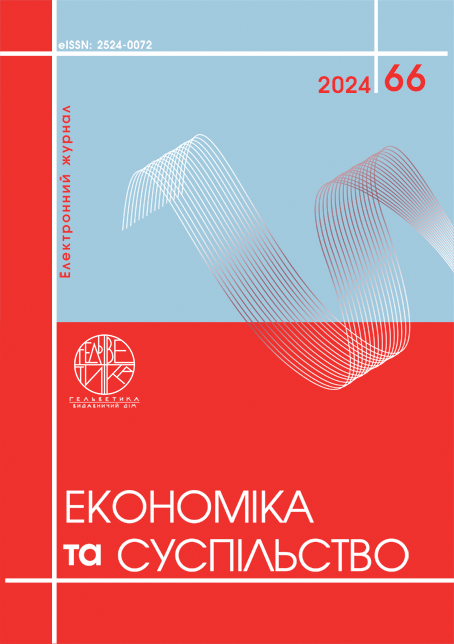ACTIVITIES OF TOURISM ENTERPRISES IN THE CONTEXT OF CHANGES AND INNOVATIVE DEVELOPMENT
Abstract
The purpose of the article is to identify the relationship between innovative development and socio-cultural potential, intercultural competence, human capital, the influence of factors on the development of the tourism sector and tourism enterprises. Innovative development of tourist enterprises is a key factor in their competitiveness in the modern world, it was established. This aspect is closely related to the effective use of such elements as human capital, socio-cultural potential and intercultural competence. The integration of socio-cultural potential into the tourism development system is manifested in such forms as the development of ethnotourism, cultural tourism, and religious tourism. The tourism sphere has a significant impact on the development of socio-cultural potential in the following areas: emergence of new values and ideas, commercialization of certain elements of culture, displacement of local languages. Employees with a high level of competence and creative thinking are able to generate new ideas and develop innovative, unique tourism products and services, quickly adapt to market and technology changes, promote the exchange of knowledge and ideas, which is critical for the successful implementation of innovations and their driving force. The relationship between the intercultural competence of personnel and the development of human capital is manifested in the following characteristics: establishing effective communication, improving the quality of service and meeting the needs of tourists from different countries, creating a positive impression, investing in the development of intercultural competence, enterprises with competent personnel form a competitive advantage in the global market tourism. Features of intercultural competence in war conditions: greater success in conflict resolution and cooperation, effective communication with different groups and taking into account their needs and views, understanding sensitive cultural issues, establishing connections and building trust between different groups, adapting to the needs and preferences of customers was singled out. The relationship and influence of the described factors on the development of the tourism sector and tourism enterprises was presented. The main directions of human capital development in the tourism sphere were presented.
References
Sarkisyan A., Lyubarov Y. Latest aspects of the development of gastronomic tourism as a component of the economic and socio-cultural environment of the regions of Ukraine. East European Scientific Journal. 2020. Vol. 1. № 11(63). рр. 66-72.
Денисенко М.П., Юринець З.В. Формування команд фахівців та їх роль в економічному розвитку й стратегічному управлінні бізнесом. Журнал стратегічних економічних досліджень. 2022. № 1. С. 67–75.
Бикова А., Чабан Л., Алексєєв А. Інвестування в людський капітал у військовий період. Економіка та суспільство. 2023. №54. URL: https://doi.org/10.32782/2524-0072/2023-54-74
Юринець З., Бабій В. Людський капітал та проблема його оцінки. «Проблеми становлення інформаційної економіки в Україні»: IV міжнародна науково-практична конференція. Львів: Видавництво ЛНУ. 2019. С. 288-290
Piróg D. Kompetencje z zakresu przedsiębiorczości: rozważania teoretyczne i ich ilustracje w obszarze szkolnictwa wyższego. Przedsiębiorczość – Edukacja. 2015. № 11. рр. 364–376.
Rasmussen E., Mosey S., Wright M. The transformation of network ties to develop entrepreneurial competencies for university spin offs. Entrepreneurship & Regional Development. 2015. № 27(7–8) ). рр. 430–457.
Sarkisyan A., Lyubarov Y. (2020) Latest aspects of the development of gastronomic tourism as a component of the economic and socio-cultural environment of the regions of Ukraine, East European Scientific Journal, vol. 1, no. 11(63), рр. 66-72.
Denysenko M. P., Yurynets Z. V. (2022) Formuvannya komand fakhivtsiv ta yikh rol v ekonomichnomu rozvytku y stratehichnomu upravlinni biznesom [Formation of teams of specialists and their role in economic development and strategic business management], Journal of Strategic Economic Studies, vol. 1, pp. 67–75. (In Ukrainian)
Bykova A., Chaban L., Aleksyeyev A. (2023) Investuvannya v lyudsʹkyy kapital u viysʹkovyy period [Investing in human capital during the war period]. Economy and society, vol. 54. Available as https://doi.org/10.32782/2524-0072/2023-54-74 (In Ukrainian)
Yurynets Z., Babiy V. (2019) Lyudskyy kapital ta problema yoho otsinky [Human capital and the problem of its assessment]. «Problemy stanovlennya informatsiynoyi ekonomiky v Ukrayini»: IV mizhnarodna naukovo-praktychna konferentsiya. Lviv: Vydavnytstvo LNU, pp. 288-290 (In Ukrainian)
Piróg D. (2015) Entrepreneurial competences: theoretical considerations and their illustrations in the field of higher education. Przedsiębiorczość – Edukacja, vol. 11, рр. 364–376 (in Polish)
Rasmussen E., Mosey S., Wright M. (2015) The transformation of network ties to develop entrepreneurial competencies for university spin offs. Entrepreneurship & Regional Development, vol. 27(7–8), рр. 430–457.


